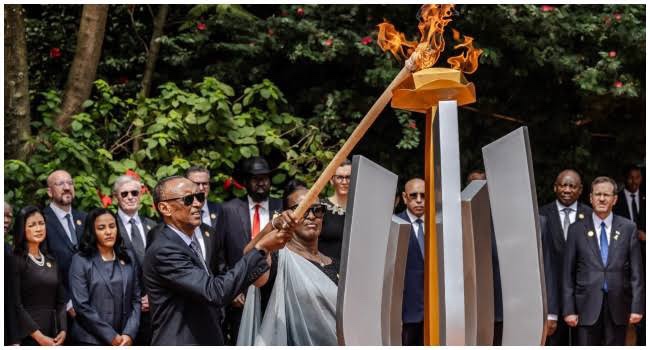Rwanda commemorates 30 years since genocide

Rwanda solemnly marked the 30th anniversary of the genocide on Sunday, remembering the devastating campaign orchestrated by Hutu extremists that plunged the nation into chaos three decades ago. The violence, which ravaged the country for 100 days before the Rwandan Patriotic Front (RPF) seized control of Kigali in July 1994, resulted in the deaths of 800,000 individuals, predominantly Tutsis but also moderate Hutus.
Under the firm leadership of President Paul Kagame, who led the RPF, Rwanda has made strides towards recovery, yet the wounds of the genocide persist, leaving a lasting impact on the Great Lakes region of Africa. As part of the commemoration, ceremonies commenced on April 7th, the day the carnage began in 1994, with President Kagame lighting a remembrance flame at the Kigali Genocide Memorial, the final resting place for over 250,000 victims.
Accompanied by foreign dignitaries, including several African leaders and former US President Bill Clinton, who acknowledged the genocide as a pivotal failure of his administration, Kagame paid tribute to the victims by laying wreaths at the mass graves. The international community’s inaction during the genocide has been a source of enduring regret, with French President Emmanuel Macron expected to express remorse for the lack of intervention.
In addition to the official ceremonies, President Kagame is scheduled to address a gathering at a 10,000-seat arena in the capital, where Rwandans will participate in a candlelight vigil to honor those lost in the massacre. The commemorative events signal the beginning of a week-long period of national mourning, during which Rwanda will observe solemn protocols, including the lowering of national flags to half-mast and restrictions on public entertainment.
The United Nations and the African Union will also hold remembrance ceremonies, underscoring the global significance of the tragedy. Karel Kovanda, a former Czech diplomat and the first UN ambassador to denounce the events as genocide, emphasized the importance of preserving the memory of the atrocities to prevent them from fading into obscurity.
The genocide was ignited by the assassination of Hutu President Juvenal Habyarimana on April 6th, 1994, which triggered a violent rampage by Hutu extremists and the notorious “Interahamwe” militia. Propaganda promoting anti-Tutsi sentiments fueled the brutal killings, which claimed the lives of hundreds of thousands and left an indelible mark on Rwandan society. Despite efforts to bring perpetrators to justice and promote reconciliation, Rwanda continues to grapple with the legacy of the genocide, as evidenced by ongoing efforts to locate and prosecute genocide suspects who have fled the country.
